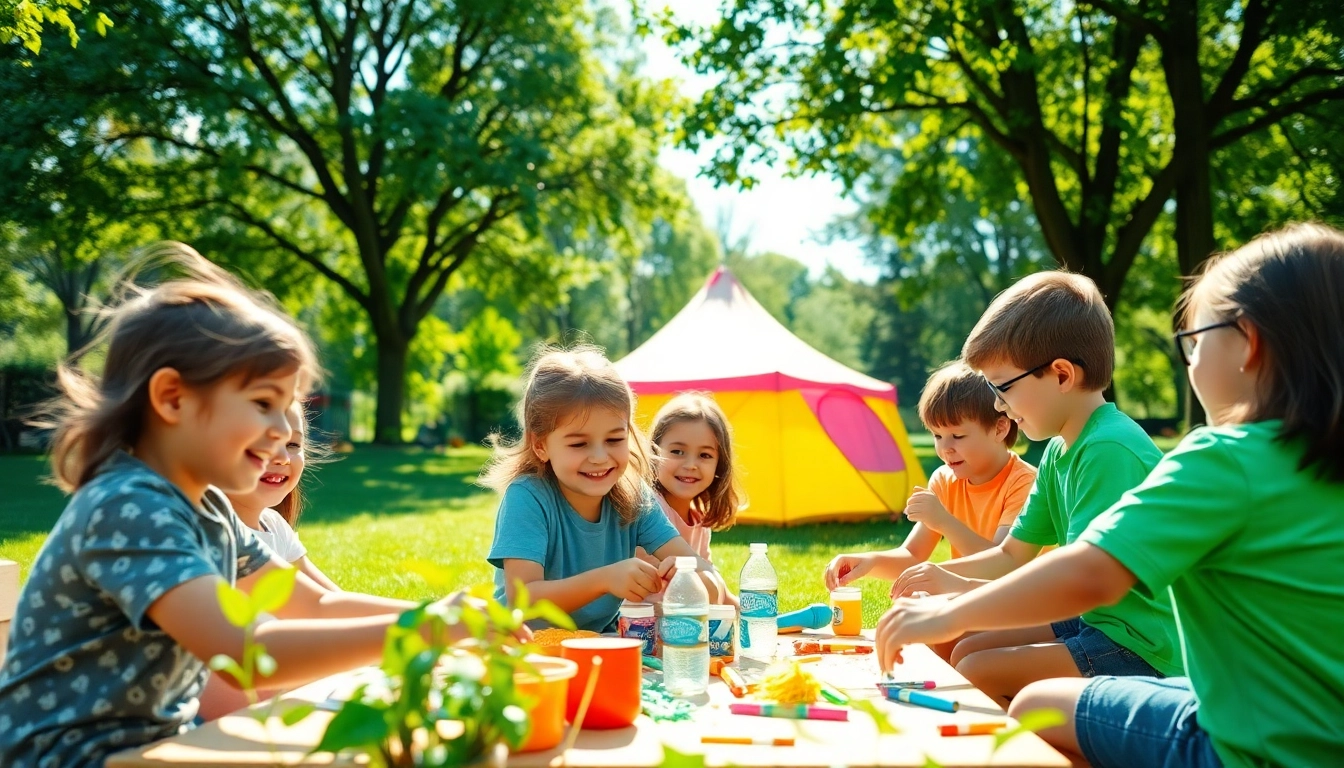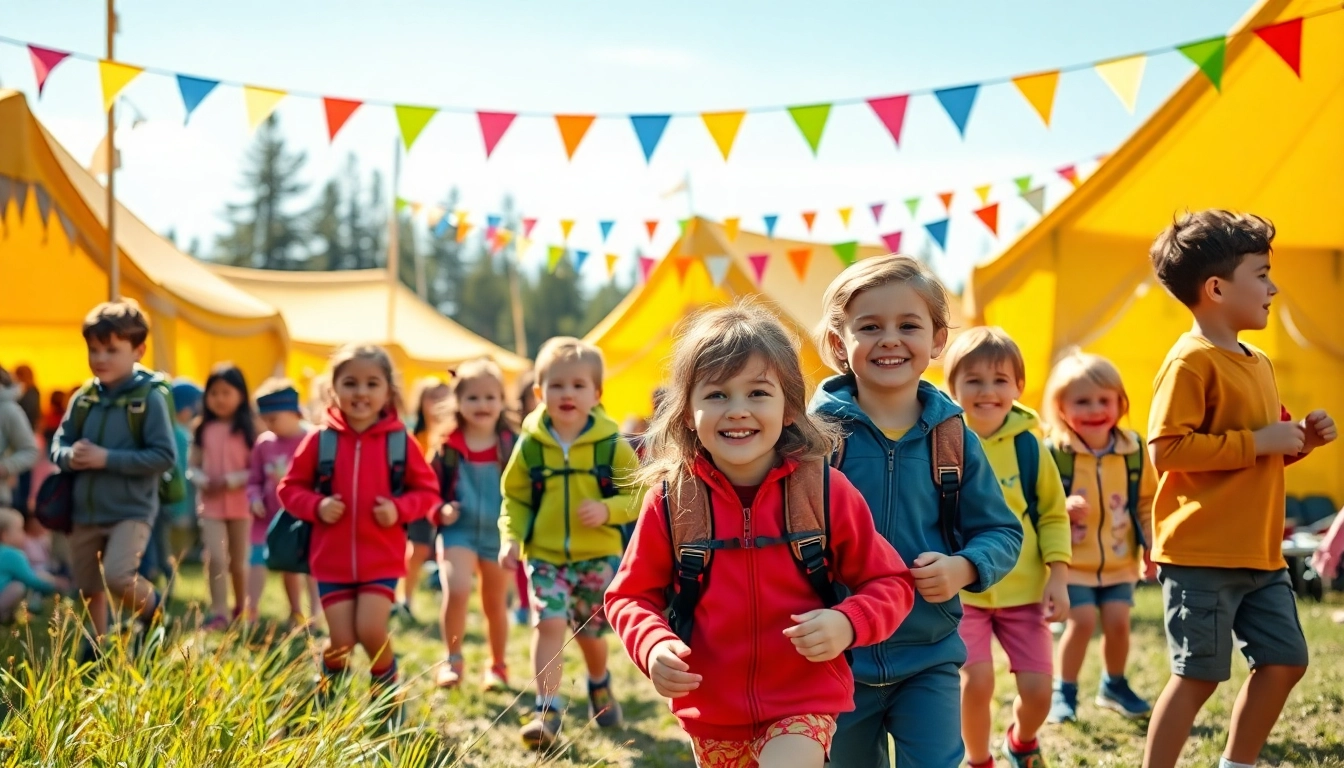1. Understanding Holiday Camps: What You Need to Know
1.1 Definition of Holiday Camps
Holiday camps are specialized venues or programs designed to provide children and families with recreational activities during school breaks or holidays. They focus on offering a safe and engaging environment where youngsters can participate in various activities, ranging from arts and crafts to sports and group games. Holiday camps are particularly popular in the United Kingdom, which boasts a rich history of camp culture. These facilities typically feature accommodations, dining options, and ample amenities that cater to children’s needs, making them an excellent choice for families looking to ensure their kids have a memorable holiday experience.
1.2 Benefits of Attending Holiday Camps
Enrolling children in holiday camps confers numerous benefits that extend beyond mere entertainment. Some key advantages include:
- Social Skills Development: Camps provide an excellent platform for children to meet peers, fostering friendships and enhancing social skills through group activities.
- Independence: Being away from home encourages children to become more self-reliant and confident, as they learn to navigate situations without parental guidance.
- Skill Building: Many holiday camps focus on specific themes, such as sports, arts, or STEM, allowing children to develop new talents or enhance existing ones.
- Fun and Engagement: The variety of activities offered keeps campers engaged, reducing the likelihood of boredom they may experience during school breaks.
- Physical Activity: Most camps promote outdoor and physical activities, thereby encouraging a more active lifestyle among children.
1.3 Types of Holiday Camps Available
When considering holiday camps, it’s essential to recognize that they can be classified into various categories based on age, focus areas, and program structures. Here are a few common types:
- General Holiday Camps: These camps offer a mix of activities suitable for various interests, including sports, crafts, and outdoor games.
- Sports Camps: Focused on physical activities, these camps specialize in specific sports, allowing children to enhance their skills in soccer, basketball, swimming, or gymnastics.
- Arts and Crafts Camps: These camps emphasize creative expression, offering children the chance to explore their artistic abilities through painting, sculpting, and other art-related activities.
- STEM Camps: Aimed at reinforcing academic concepts in science, technology, engineering, and mathematics, these camps provide hands-on projects and learning opportunities.
- Adventure Camps: Incorporating elements like hiking, climbing, and outdoor survival skills, these camps focus on adventurous activities for thrill-seeking youth.
2. Choosing the Right Holiday Camp for Your Child
2.1 Factors to Consider When Selecting Camps
Choosing the perfect holiday camp for your child requires thoughtful consideration of several factors:
- Child’s Interests: Tailor your choice to the specific interests and hobbies of your child. Whether they enjoy sports, arts, or outdoor activities, finding a camp that aligns with their passions will ensure a more enjoyable experience.
- Age Appropriateness: Ensure the camp is suitable for your child’s age group. Camps often delineate activities based on age ranges, and choosing a program that challenges yet supports your child is vital.
- Location: Opt for a camp that is conveniently located to minimize travel stress. Consider the camp’s accessibility and the surrounding environment, whether it’s urban or more nature-oriented.
- Camp Size: The size of the camp can impact the level of personal attention your child receives. Smaller camps often provide a more intimate experience, while larger camps may offer diverse activity choices.
- Staff Qualifications: Research the experience and credentials of camp counselors and instructors. Qualified staffs enhance safety and ensure a more enriching environment.
2.2 How to Identify Quality Holiday Camps
With countless options available, identifying high-quality holiday camps can be challenging. To ensure a great fit, consider the following recommendations:
- Research Online: Use online resources to compare camps in your area. Websites like holiday camps provide valuable insights and reviews from parents.
- Visit the Camp: If feasible, schedule a visit to the camp prior to enrollment. This allows you to assess the facilities, meet the staff, and observe the environment in which your child will be spending time.
- Seek Recommendations: Connect with other parents or child care professionals to get recommendations based on first-hand experiences.
- Check Accreditations: Look for camps accredited by recognized organizations, as this can denote higher standards of quality and safety.
- Read Reviews: Explore testimonials and reviews from past campers and their parents for feedback on their experiences and satisfaction levels.
2.3 Top Holiday Camp Recommendations
Based on various criteria such as quality, activities offered, and camper satisfaction, here are some top recommendations for holiday camps to consider:
- YMCA Holiday Camps: With different programs nationwide, the YMCA organizes holiday camps that foster community spirit and teamwork while providing a range of engaging activities.
- Camp Sunshine: Designed specifically for children with life-threatening illnesses, Camp Sunshine hosts recreational and therapeutic activities, offering a supportive and fun environment.
- Nature Camps: Various organizations conduct nature camps that teach children about the environment, sustainability, and wildlife while engaging in outdoor activities such as hiking and wildlife observation.
- STEM Summer Camps: Focused on enhancing critical thinking skills, these camps typically include robotics, coding, and engineering challenges, appealing particularly to inquisitive minds.
- Artistic Endeavors: Many local institutions offer holiday art camps that cater to young artists, allowing them to explore different mediums and techniques in a supportive atmosphere.
3. Preparing Your Child for Camp: A Parent’s Guide
3.1 Essential Items to Pack
Preparation is key to ensuring your child has a successful camp experience. Here is a checklist of essential items to pack:
- Clothing: Include comfortable, weather-appropriate clothing along with sturdy shoes for outdoor activities.
- Personal Care Items: Pack toiletries, sunscreen, hats, and any necessary medications, ensuring they are clearly labeled.
- Reusable Water Bottle: Staying hydrated is crucial, so pack a refillable water bottle for your child.
- Optional Items: Depending on the camp’s activities, consider including items like swim gear, art supplies, or sports equipment.
- Comfort Item: If your child has a favorite blanket or stuffed animal, include it to provide comfort and a sense of security.
3.2 Discussing Expectations with Your Child
Having an open dialogue with your child about the upcoming camp experience is essential in setting expectations. Here are some points to discuss:
- Activities: Share an overview of activities they will participate in so they can get excited about what’s in store.
- Friendship: Encourage your child to make new friends, stressing the importance of social interactions and teamwork.
- Independence: Explain the value of trying new things on their own while knowing you are just a call away if they feel overwhelmed.
- Rules and Behavior: Talk about the camp’s rules and expectations regarding behavior to ensure your child understands what is acceptable.
3.3 Safety Considerations for Holiday Camps
Safety should always be a priority when it comes to holiday camps. Parents can enhance their child’s safety by considering the following measures:
- Check Safety Protocols: Inquire about the camp’s safety protocols, including emergency procedures and first aid capabilities.
- Communication: Establishing a communication plan allows your child to feel less anxious; discuss how they can reach you if they feel uncomfortable.
- Special Needs: If your child has special needs, ensure the camp is equipped to accommodate them, including dietary restrictions and accessibility concerns.
- Check Insurance: Verify that the camp has appropriate insurance coverage to safeguard against accidents or injuries.
4. Popular Activities at Holiday Camps
4.1 Arts and Crafts to Spark Creativity
Arts and crafts activities at holiday camps provide children with an opportunity to express their creativity in various ways. Common activities might include:
- Painting: Using watercolors, acrylics, or digital platforms, children can explore their artistic flair.
- Sculpting: Creating three-dimensional art through clay or recycled materials fosters imaginative thinking.
- Textile Projects: Activities such as sewing or creating decorations from fabric can build fine motor skills and eye-hand coordination.
4.2 Sports and Games for Physical Engagement
Engaging in sports and games is paramount to holiday camps as it encourages physical fitness and teamwork. Some popular options include:
- Team Sports: Camps may offer organized sports like soccer, basketball, volleyball, and field hockey to promote teamwork and friendly competition.
- Individual Sports: Activities like tennis, swimming, or martial arts allow children to focus on personal skill development.
- Outdoor Games: Traditional games such as capture the flag, tug-of-war, or scavenger hunts foster cooperation and strategy.
4.3 The Importance of Team-Building Activities
Team-building activities play a crucial role in building camaraderie among campers. These activities often focus on collaboration and communication, some examples include:
- Obstacle Courses: Teams work together to navigate physical challenges, improving their problem-solving skills.
- Group Challenges: Collaborative games that require teamwork to achieve a common goal can strengthen relationships among campers.
- Trust Games: Activities designed to build trust, such as trust falls or partner challenges, enhance self-esteem and interdependence.
5. Conclusion: Making the Most of Your Holiday Camp Experience
5.1 Encouraging Independence and Social Skills
As children navigate holiday camps, they often emerge with increased confidence, independence, and enhanced social skills. Encourage your child to seize opportunities to meet new friends and try unfamiliar activities, supporting their growth during their camp experience.
5.2 Gathering Feedback After the Camp
Once your child’s camp experience is complete, actively engage in discussions about what they enjoyed and learned. This feedback can provide invaluable insights into your child’s growth and interests, informing future camp selections.
5.3 Plans for Future Holiday Camps
Reflect on your child’s camp experience and develop plans for future camps. Whether it’s selecting new camps based on their evolving interests or returning to previous favorites based on a favorable experience, early planning can ensure desirable options are available for upcoming school breaks.



